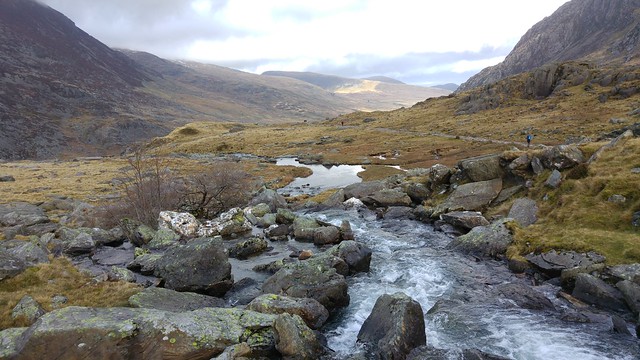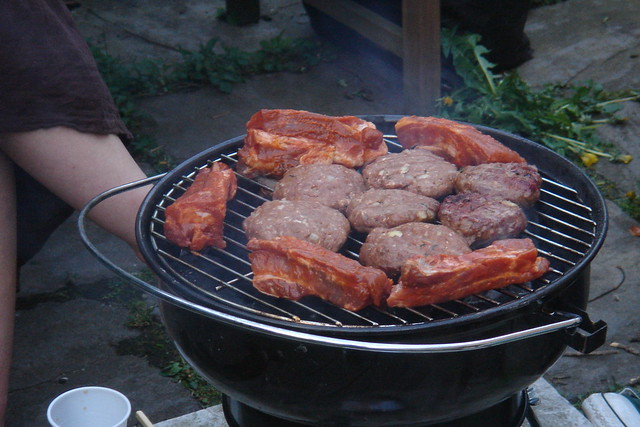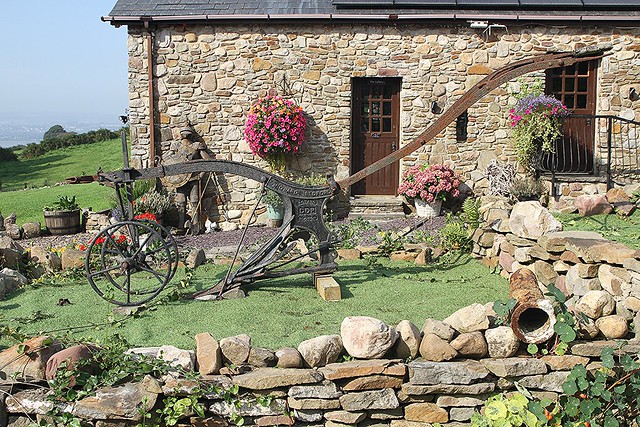Words for yoke, bond and related things in Celtic languages.
Words marked with a * are reconstructions.
| Proto-Celtic | *yugom = yoke *komyungis = (?) |
|---|---|
| Gaulish | *yugom = yoke (?) *Weryugos = personal name |
| Old Irish (Goídelc) | cuing = yoke |
| Middle Irish (Gaoidhealg) | cuing, coing = yoke, burden, duty, sway, discipline, behaviour |
| Irish (Gaeilge) | cuing [kiːɲɟ/kɪɲ] = yoke, bond, obligation, tie, beam, narrow neck of land (as between two lakes) cuingealach = jugular cuingigh = to yoke, enjoin cuingir = yoke, pair, couple, group, herd cuingleánach = yoked cuingrigh = yoke, couple |
| Scottish Gaelic (Gàidhlig) | cuing [kɯ̃ĩŋʲgʲ] = yoke, asthma, bond, obligation cuinge [kɯ̃ĩŋʲgʲə] = narrow place, passage, pass, difficulty, limitation cuingeach [kɯ̃ĩŋʲgʲəx] = asthmatic cuingeachadh [kɯ̃ĩŋʲgʲəxəɣ] = (act of) yoking, abridgement, constraining, restricting, constraint cuingeachail [kɯiŋʲgʲəxal] = limiting, restrictive cuingealach [kɯ̃ĩŋʲgʲəl̪ˠəx] = restricted, shackled, constricted |
| Manx (Gaelg) | quing = yoke, brace, team of oxen, (balance) beam quingaghey = to subjugate, yoke quingey = to yoke quingit = yoked |
| Proto-Brythonic | *jọw = yoke |
| Old Welsh (Kembraec) | iou = yoke |
| Middle Welsh (Kymraec) | iou, yeu, iau, jav = yoke |
| Welsh (Cymraeg) | iau [jaɨ̯/jai̯] = yoke, pair of oxen, sway, dominion, authority, discipline, oppression |
| Old Cornish | ieu = yoke |
| Middle Cornish (Cernewec) | yeu = yoke |
| Cornish (Kernewek) | yew = yoke war yew = onward |
| Middle Breton (Brezonec) | yeu, yau = yoke |
| Breton (Brezhoneg) | yev [jew] = yoke, servitude yevad = yoke, hitch, team, coupling yevan, yevañ = to yoke, subjugate, enslave |
Etymology: from the Proto-Indo-European *yugóm (yoke) or *yung, from *yewg- (to join, yoke, tie together) [source]. Words from the same roots include adjunct, conjugate, join, jugular, junction, yoga and yoke in English, joindre (to join up, reach, contact) in French, and junto (together, joined, next to) in Spanish [source].
| Proto-Celtic | *wedos = yoke, harness |
|---|---|
| Old Irish (Goídelc) | fedan = band, carrying, company, drawing feidid [ˈɸʲeðʲiðʲ] = to bring, lead |
| Middle Irish (Gaoidhealg) | fedan, feadhan, fedhain = (act of) carrying, conveying, carriage, harness, band, company, part, some feidid, fedid = to bring, lead, refer, apply |
| Irish (Gaeilge) | feadhain = band, troop, company |
| Scottish Gaelic (Gàidhlig) | feadhain = team of horses |
| Manx (Gaelg) | fwirran = staff, team |
| Middle Welsh (Kymraec) | gued, guet, gved, gwedd = yoke, harness guedu, gwedha = to be coupled with a yoke, be yoked gwedeu, guedeu = traces, draught-harness gwedhau = to submit, pay homage |
| Welsh (Cymraeg) | gwedd [ɡweːð] = yoke, harness, team (of horses, oxen, etc), bondage, captivity, submission, humility, homage, offspring, progeny, children gweddaf, gweddu = to be coupled with a yoke, be yoked, submit, humble oneself gweddau = traces, draught-harness |
Etymology: from the Proto-Indo-European *wedʰ- (to bind, secure, pledge, guarantee, lead) [source]. Words from the same roots include gage, wage, wager and wed in English, Wette (bet) in German, and gage (pledge, guarantee, deposit) in French [source].
| Old Irish (Goídelc) | mám [maːm] = yoke |
|---|---|
| Middle Irish (Gaoidhealg) | mám = yoke |
| Irish (Gaeilge) | mám = yoke |
Etymology: ? [source].
Sources: Wiktionary, Am Faclair Beag, Online Manx Dictionary, Teanglann.ie, eDIL – Electronic Dictionary of the Irish Language, In Dúil Bélrai English – Old Irish glossary, Geiriadur Prifysgol Cymru, Gerlyver Kernewek, Dictionaire Favereau, TermOfis, English – ProtoCeltic WordList (PDF), Etymological Dictionary Of Proto Celtic














